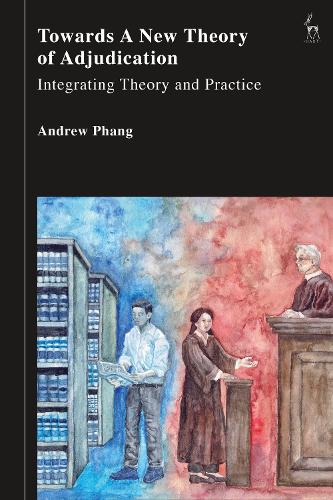
Towards a New Theory of Adjudication: Integrating Theory and Practice
(Hardback)
Publishing Details
Towards a New Theory of Adjudication: Integrating Theory and Practice
By (Author) Andrew Phang
Bloomsbury Publishing PLC
Hart Publishing
27th November 2025
United Kingdom
Classifications
Professional and Scholarly
Non Fiction
Comparative law
341.55
Physical Properties
Hardback
336
Width 156mm, Height 234mm
Description
This book explores the major theories of common law adjudication and presents a new theory of adjudication.
It shows that the existing major theories of common law adjudication each capture only part of what occurs in actual court proceedings. It presents a new theory of adjudication that incorporates both useful and modified elements of these theories. The new theory itself comprises two parts: first, an attitudinal aspect based on institutional values; and second, a number of practical and theoretical factors which give concrete expression to those values.
Throughout the book, the author draws on his prior experience both as a law professor and as a judge in his countrys highest appellate court in order to provide a unique perspective that illustrates this new theory.
Reviews
In Towards a New Theory of Adjudication, former Justice of Appeal Andrew Phang provides an insightful critique of the major theories of legal reasoning and adjudication, and building on that analysis, propounds his own theory of adjudication. The unique perspective of this book is that it comes from someone who has combined a career as an academic with a long-standing interest in legal theory with the practical experience of being a judge of the Singapore High Court and Court of Appeal. The theoretical issues discussed are illustrated by reference to decided cases, in many of which the author wrote or contributed to the courts reasoning. The result is a book which manages to bridge the divide between theory and practice, and which I strongly recommend. * Mr Justice David Foxton, High Court Judge, Kings Bench Division and Judge of the Commercial Court *
Justice Phangs deft analytical skills, honed as a scholar and a jurist, make his new theory of adjudication particularly profound. It is a theory developed through eagle eyed analysis and a deep understanding of both legal theory and adjudicative method. A must read for anyone seeking to make sense of common law adjudication. * Professor Liz Fisher, Faculty of Law, University of Oxford *
Justice Phang has written a masterful work on jurisprudence that should be read by law students, legal practitioners and judges. Drawing on his vast experiences and deep insight as a Professor and a Judge, he provides a rare blend of a strong philosophical foundation for the practice of judicial adjudication and a practical edge to jurisprudential theory. His analysis of the major works of the jurisprudential giants of classical jurisprudence is accessible, illuminating and compelling. His work on a new theory of adjudication, is rich in values, deep reflections and practical utility. It is worth returning to constantly, for those who seek to improve as judges, in the pursuit of justice. * Justice Kwek Mean Luck, Supreme Court, Singapore Chairman, Singapore Judicial College *
In this invaluable treatise, the author embarks on an ambitious project to present a new and compelling model of adjudication encompassing a line of reasoning that reconciles legal theory with the realities of judicial practice. He achieves the difficult goal of bridging the often-divergent realms of legal theory and judicial practice. The model is particularly convincing, given the authors extensive and renowned experience and expertise in both the judicial and academic fields of law. In brief, Towards A New Theory of Adjudication affords an influential new contribution to legal scholarship for academics, adjudicators and jurists attracted to the dynamics of judicial reasoning and decision-making. * The Honourable Justice Tan Sri Datuk Nallini Pathmanathan, Judge, Federal Court of Malaysia *
Drawing on legal theory and philosophy, and referencing decided cases as touchpoints, in Towards a New Theory of Adjudication Justice Phang seeks to fill the gap in the extant literature by offering a robust new theory of adjudication that provides practical guiderails for the reader. By focussing on judicial attitude, as informed by judicial values, the theory of adjudication posited in this book is directed ambitiously at achieving both procedural and substantive fairness. In Justice Phangs inimitable style, the book is well-structured and logical with a delightful mix of informal conversational flair and intellectual rigour. * Professor Natalie Skead, Dean, Singapore Judicial College and Professor of Law, The University of Western Australia *
Justice Phang calls this book a labour of love. But it is more than that. Part intimate memoir and part academic treatise, this is both Justice Phangs most introspective and his most analytical work to date. It is analytical in the way that Justice Phang critically evaluates various modern theories on the nature of law. It is introspective in the way that Justice Phang repeatedly asks himself whether the theories actually reflect his almost 20 years of experience as a Singapore judge. In the end, Justice Phang concludes that it is Dworkins theory that, with suitable modification, comes closest to capturing how judges decide. It is Justice Phangs modified theory, focussing on the strengths and (especially) limits of practical adjudication, that will be of interest, not merely to judges, but also to law students, academics and lay readers. * Justice Anselmo Reyes, International Judge, Singapore International Commercial Court and former Judge of the Court of First Instance in Hong Kong *
Author Bio
Andrew Phang is a Senior Judge at the Supreme Court of Singapore and Distinguished Professor of Law, Yong Pung How School of Law, Singapore Management University.
